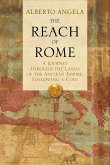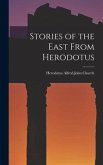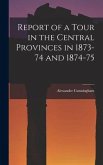Schade – dieser Artikel ist leider ausverkauft. Sobald wir wissen, ob und wann der Artikel wieder verfügbar ist, informieren wir Sie an dieser Stelle.
- Gebundenes Buch
- Merkliste
- Auf die Merkliste
- Bewerten Bewerten
- Teilen
- Produkt teilen
- Produkterinnerung
- Produkterinnerung
Focusing on the depiction of the natural world in Herodotus' Histories, this volume explores the fluid and complex network of spatial relationships that emerges from his narrative, examining its significance for the analysis of focalization in the work and for understanding the role of geography in the shaping of successive empires.
Andere Kunden interessierten sich auch für
![Around the world on a bicycle Around the world on a bicycle]() Thomas StevensAround the world on a bicycle31,99 €
Thomas StevensAround the world on a bicycle31,99 €![The Reach of Rome: A Journey Through the Lands of the Ancient Empire, Following a Coin The Reach of Rome: A Journey Through the Lands of the Ancient Empire, Following a Coin]() Alberto AngelaThe Reach of Rome: A Journey Through the Lands of the Ancient Empire, Following a Coin21,99 €
Alberto AngelaThe Reach of Rome: A Journey Through the Lands of the Ancient Empire, Following a Coin21,99 €![Stories of the East From Herodotus Stories of the East From Herodotus]() Herodotus Alfred John ChurchStories of the East From Herodotus36,99 €
Herodotus Alfred John ChurchStories of the East From Herodotus36,99 €![The Shaping of 'Abbasid Rule The Shaping of 'Abbasid Rule]() Jacob LassnerThe Shaping of 'Abbasid Rule46,99 €
Jacob LassnerThe Shaping of 'Abbasid Rule46,99 €![Travels in Lycia, Milyas, and the Cibyratis, by T.a.B. Spratt and E. Forbes Travels in Lycia, Milyas, and the Cibyratis, by T.a.B. Spratt and E. Forbes]() Edward ForbesTravels in Lycia, Milyas, and the Cibyratis, by T.a.B. Spratt and E. Forbes35,99 €
Edward ForbesTravels in Lycia, Milyas, and the Cibyratis, by T.a.B. Spratt and E. Forbes35,99 €![Report of a Tour in the Central Provinces and Lower Gangetic Doab in 1881-82 Report of a Tour in the Central Provinces and Lower Gangetic Doab in 1881-82]() Alexander CunninghamReport of a Tour in the Central Provinces and Lower Gangetic Doab in 1881-8232,99 €
Alexander CunninghamReport of a Tour in the Central Provinces and Lower Gangetic Doab in 1881-8232,99 €![Report of a Tour in the Central Provinces in 1873-74 and 1874-75 Report of a Tour in the Central Provinces in 1873-74 and 1874-75]() Alexander CunninghamReport of a Tour in the Central Provinces in 1873-74 and 1874-7531,99 €
Alexander CunninghamReport of a Tour in the Central Provinces in 1873-74 and 1874-7531,99 €-
-
-
Focusing on the depiction of the natural world in Herodotus' Histories, this volume explores the fluid and complex network of spatial relationships that emerges from his narrative, examining its significance for the analysis of focalization in the work and for understanding the role of geography in the shaping of successive empires.
Produktdetails
- Produktdetails
- Verlag: Oxford University Press
- Seitenzahl: 368
- Erscheinungstermin: 21. August 2018
- Englisch
- Abmessung: 218mm x 137mm x 30mm
- Gewicht: 576g
- ISBN-13: 9780198820437
- ISBN-10: 0198820437
- Artikelnr.: 50498773
- Herstellerkennzeichnung
- Libri GmbH
- Europaallee 1
- 36244 Bad Hersfeld
- gpsr@libri.de
- Verlag: Oxford University Press
- Seitenzahl: 368
- Erscheinungstermin: 21. August 2018
- Englisch
- Abmessung: 218mm x 137mm x 30mm
- Gewicht: 576g
- ISBN-13: 9780198820437
- ISBN-10: 0198820437
- Artikelnr.: 50498773
- Herstellerkennzeichnung
- Libri GmbH
- Europaallee 1
- 36244 Bad Hersfeld
- gpsr@libri.de
Katherine Clarke undertook her BA in Classics (Literae Humaniores) at St John's College, Oxford, before going on to obtain her D.Phil. in Ancient History also at Oxford in 1996, where she held a Graduate Scholarship followed by a Junior Research Fellowship, both at Christ Church. In 1998 she was appointed to the Tutorial Fellowship in Ancient History at St Hilda's College, where she has remained ever since. She was the recipient of a Philip Leverhulme Prize for the period 2001-3 and has held various positions of responsibility in both her College and the university's Faculty of Classics including Vice Principal in College, 2013-16, and Chair of the Sub-Faculty, 2015-17.
* I. Reading Herodotus in Context
* 1: . . . there was no Herodotus before Herodotus'
* 1.a: Treading in the footsteps of giants
* 1.b: Finding space in the study of Herodotus
* 1.b.i: Herodotus' spaces, peoples, and places: the scholarly
landscape
* 1.b.ii: Sharpening the lens: bringing focalization into play
* 1.c: Location, location, location: Herodotus' world and the dynamics
of empire
* II. Herodotus' Sense of Place and Space
* 2: Mapping out the World
* 2.a: Mapping the extremes
* 2.b: Filling in the broad canvas: continents and comparisons
* 2.c: Marching through the landscape: the geography of expeditions
* 2.d: Trade, tourism, and theoria
* 2.e: The evocative list
* 3: Lines and Dots
* 3.a: Criss-crossing the narrative: rivers and the articulation of
space
* 3.b: Fonts of rivers, spines of the land: mountains in Herodotus'
landscape
* 3.c: Islands
* 3.c.i: The specialness of being nesiotes
* 3.c.ii: Transformation and migration
* 3.c.iii: The island as a commodity
* III. Giving Meaning to Space
* 4: Depth and Resonance
* 4.a: Wonderful world: works of nature, works of man
* 4.b: The dimension of time: unlocking the mythical landscape
* 4.c: Collapsing spaces, parallel places
* 5: Geographical Morality
* 5.a: Good and bad control: modulating the moral landscape
* 5.b: Negotiating the rivers, moral barometers
* 5.b.i: Walking on water: sailing over land
* 5.b.ii: Bridging rivers, bridging continents: crossing the great
divide
* 5.b.iii: Reaching the Promised Land: entering the Gardens of Midas
* IV. Grand Designs
* 6: The Conquest of Nature: Herodotus' 'Military Narrative'
* 6.a: The allure of beauty and the language of desire
* 6.b: The metaphor of conquest: slavery, rage, punishment, and
subjugation
* 6.c: Nature joins battle: opposition and alliance
* 6.d: (Mis)understanding the divine
* 7: Writing an Imperial Geography
* 7.a: Determining nature's will: stability or mobility
* 7.b: Thinking big: imperial designs and the problem of hybris
* 7.c: Passion for power: a Persian paradigm?
* 7.d: Herodotus and the geography of dynamis
* Epilogue
* Endmatter
* References
* Subject Index
* Index of Passages Discussed
* 1: . . . there was no Herodotus before Herodotus'
* 1.a: Treading in the footsteps of giants
* 1.b: Finding space in the study of Herodotus
* 1.b.i: Herodotus' spaces, peoples, and places: the scholarly
landscape
* 1.b.ii: Sharpening the lens: bringing focalization into play
* 1.c: Location, location, location: Herodotus' world and the dynamics
of empire
* II. Herodotus' Sense of Place and Space
* 2: Mapping out the World
* 2.a: Mapping the extremes
* 2.b: Filling in the broad canvas: continents and comparisons
* 2.c: Marching through the landscape: the geography of expeditions
* 2.d: Trade, tourism, and theoria
* 2.e: The evocative list
* 3: Lines and Dots
* 3.a: Criss-crossing the narrative: rivers and the articulation of
space
* 3.b: Fonts of rivers, spines of the land: mountains in Herodotus'
landscape
* 3.c: Islands
* 3.c.i: The specialness of being nesiotes
* 3.c.ii: Transformation and migration
* 3.c.iii: The island as a commodity
* III. Giving Meaning to Space
* 4: Depth and Resonance
* 4.a: Wonderful world: works of nature, works of man
* 4.b: The dimension of time: unlocking the mythical landscape
* 4.c: Collapsing spaces, parallel places
* 5: Geographical Morality
* 5.a: Good and bad control: modulating the moral landscape
* 5.b: Negotiating the rivers, moral barometers
* 5.b.i: Walking on water: sailing over land
* 5.b.ii: Bridging rivers, bridging continents: crossing the great
divide
* 5.b.iii: Reaching the Promised Land: entering the Gardens of Midas
* IV. Grand Designs
* 6: The Conquest of Nature: Herodotus' 'Military Narrative'
* 6.a: The allure of beauty and the language of desire
* 6.b: The metaphor of conquest: slavery, rage, punishment, and
subjugation
* 6.c: Nature joins battle: opposition and alliance
* 6.d: (Mis)understanding the divine
* 7: Writing an Imperial Geography
* 7.a: Determining nature's will: stability or mobility
* 7.b: Thinking big: imperial designs and the problem of hybris
* 7.c: Passion for power: a Persian paradigm?
* 7.d: Herodotus and the geography of dynamis
* Epilogue
* Endmatter
* References
* Subject Index
* Index of Passages Discussed
* I. Reading Herodotus in Context
* 1: . . . there was no Herodotus before Herodotus'
* 1.a: Treading in the footsteps of giants
* 1.b: Finding space in the study of Herodotus
* 1.b.i: Herodotus' spaces, peoples, and places: the scholarly
landscape
* 1.b.ii: Sharpening the lens: bringing focalization into play
* 1.c: Location, location, location: Herodotus' world and the dynamics
of empire
* II. Herodotus' Sense of Place and Space
* 2: Mapping out the World
* 2.a: Mapping the extremes
* 2.b: Filling in the broad canvas: continents and comparisons
* 2.c: Marching through the landscape: the geography of expeditions
* 2.d: Trade, tourism, and theoria
* 2.e: The evocative list
* 3: Lines and Dots
* 3.a: Criss-crossing the narrative: rivers and the articulation of
space
* 3.b: Fonts of rivers, spines of the land: mountains in Herodotus'
landscape
* 3.c: Islands
* 3.c.i: The specialness of being nesiotes
* 3.c.ii: Transformation and migration
* 3.c.iii: The island as a commodity
* III. Giving Meaning to Space
* 4: Depth and Resonance
* 4.a: Wonderful world: works of nature, works of man
* 4.b: The dimension of time: unlocking the mythical landscape
* 4.c: Collapsing spaces, parallel places
* 5: Geographical Morality
* 5.a: Good and bad control: modulating the moral landscape
* 5.b: Negotiating the rivers, moral barometers
* 5.b.i: Walking on water: sailing over land
* 5.b.ii: Bridging rivers, bridging continents: crossing the great
divide
* 5.b.iii: Reaching the Promised Land: entering the Gardens of Midas
* IV. Grand Designs
* 6: The Conquest of Nature: Herodotus' 'Military Narrative'
* 6.a: The allure of beauty and the language of desire
* 6.b: The metaphor of conquest: slavery, rage, punishment, and
subjugation
* 6.c: Nature joins battle: opposition and alliance
* 6.d: (Mis)understanding the divine
* 7: Writing an Imperial Geography
* 7.a: Determining nature's will: stability or mobility
* 7.b: Thinking big: imperial designs and the problem of hybris
* 7.c: Passion for power: a Persian paradigm?
* 7.d: Herodotus and the geography of dynamis
* Epilogue
* Endmatter
* References
* Subject Index
* Index of Passages Discussed
* 1: . . . there was no Herodotus before Herodotus'
* 1.a: Treading in the footsteps of giants
* 1.b: Finding space in the study of Herodotus
* 1.b.i: Herodotus' spaces, peoples, and places: the scholarly
landscape
* 1.b.ii: Sharpening the lens: bringing focalization into play
* 1.c: Location, location, location: Herodotus' world and the dynamics
of empire
* II. Herodotus' Sense of Place and Space
* 2: Mapping out the World
* 2.a: Mapping the extremes
* 2.b: Filling in the broad canvas: continents and comparisons
* 2.c: Marching through the landscape: the geography of expeditions
* 2.d: Trade, tourism, and theoria
* 2.e: The evocative list
* 3: Lines and Dots
* 3.a: Criss-crossing the narrative: rivers and the articulation of
space
* 3.b: Fonts of rivers, spines of the land: mountains in Herodotus'
landscape
* 3.c: Islands
* 3.c.i: The specialness of being nesiotes
* 3.c.ii: Transformation and migration
* 3.c.iii: The island as a commodity
* III. Giving Meaning to Space
* 4: Depth and Resonance
* 4.a: Wonderful world: works of nature, works of man
* 4.b: The dimension of time: unlocking the mythical landscape
* 4.c: Collapsing spaces, parallel places
* 5: Geographical Morality
* 5.a: Good and bad control: modulating the moral landscape
* 5.b: Negotiating the rivers, moral barometers
* 5.b.i: Walking on water: sailing over land
* 5.b.ii: Bridging rivers, bridging continents: crossing the great
divide
* 5.b.iii: Reaching the Promised Land: entering the Gardens of Midas
* IV. Grand Designs
* 6: The Conquest of Nature: Herodotus' 'Military Narrative'
* 6.a: The allure of beauty and the language of desire
* 6.b: The metaphor of conquest: slavery, rage, punishment, and
subjugation
* 6.c: Nature joins battle: opposition and alliance
* 6.d: (Mis)understanding the divine
* 7: Writing an Imperial Geography
* 7.a: Determining nature's will: stability or mobility
* 7.b: Thinking big: imperial designs and the problem of hybris
* 7.c: Passion for power: a Persian paradigm?
* 7.d: Herodotus and the geography of dynamis
* Epilogue
* Endmatter
* References
* Subject Index
* Index of Passages Discussed








